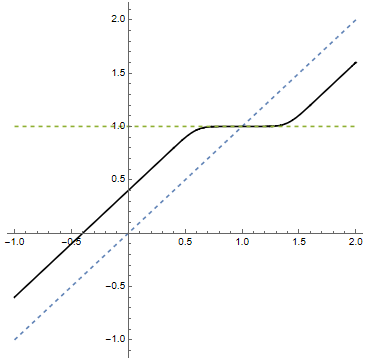$\newcommand\R{\mathbb R}\newcommand{\ep}{\epsilon}$This is achieved simply by convolution. Indeed, for real $x$ let
\begin{equation*}
F(x):=\begin{cases}
x+2 &\text{ if } x\leq -2, \\
0 &\text{ if } -2<x\leq 2, \\
x-2 &\text{ if } x>2,
\end{cases}
\end{equation*}
\begin{equation*}
g(x):=\max(0,1-|x|),
\end{equation*}
\begin{equation*}
h(x):=(F*g)(x)=\int_{\R}F(x-y)g(y)\,dy.
\end{equation*}
It is straightforward to obtain an explicit piecewise-polynomial expression for $h(x)$ (now given at the end of the answer, on a request by the OP).
Note that $g\ge0$, $\int_{\R}g(y)\,dy=1$, and $0\le F'\le1$, where $F'$ denotes (say) the right derivative of $F'$.
It is easy to see that
\begin{equation*}
\text{$h(x)=0$ if $|x|\le1$},\tag{1}
\end{equation*}
\begin{equation*}
h'(x)=\int_{\R}F'(x-y)g(y)\,dy\in[0,1],\tag{2}
\end{equation*}
\begin{equation*}
h''(x)=g(x-2)-g(x+2)\in[-1,1],\tag{3}
\end{equation*}
\begin{equation*}
h\in C^2(\R). \tag{3a}
\end{equation*}
Also, $|F(x)-x|\le2$ and $\int_{\R}(x-y)g(y)\,dy=x$, and hence
\begin{equation*}
|h(x)-x|\le\int_{\R}|F'(x-y)-(x-y)|g(y)\,dy\le\int_{\R}2g(y)\,dy=2. \tag{4}
\end{equation*}
Let now $a:=\bar x$ and then
\begin{equation*}
f_\ep(x):=f_{a;\ep}(x):=a+\ep h\Big(\frac{x-a}\ep\Big).
\end{equation*}
Then $f_\ep\in C^2(\R)$ (by (3a)), $f'_\ep(x)=h'\big(\frac{x-a}\ep\big)\in[0,1]$ (by (2)), $f''_\ep(x)=\frac1\ep\,h''\big(\frac{x-a}\ep\big)\in[-\frac1\ep,\frac1\ep]$ (by (3)), $f_\ep=a$ on $[-\ep,\ep]$ (by (1)), and $\|f_\ep-\mathrm{Id}\|_{L^\infty}\le2\ep$ (by (4)). So, $f_\ep$ satisfies all the desired conditions.
Here are the graphs $\{(x,f_{a;\ep}(x))\colon-1\le x\le2\}$ for $a=1$ and $\ep=2/10$ (black), $\{(x,x)\colon-1\le x\le2\}$ (blue, dashed), and $\{(x,1)\colon-1\le x\le2\}$ (green, dashed):

Here is the mentioned explicit piecewise-polynomial expression for $h(x)$:
\begin{equation}
h(x)=
\begin{cases}
x-2 &\text{ if } x>3 , \\
x+2 &\text{ if } x\leq -3 , \\
\frac{1}{6} \left(-x^3-9 x^2-21 x-15\right) &\text{ if } -3<x\leq -2 , \\
\frac{1}{6} \left(-x^3+9 x^2-21 x+15\right) &\text{ if } 2<x\leq 3 , \\
\frac{1}{6} \left(x^3-3 x^2+3 x-1\right) &\text{ if } 1<x\leq 2 , \\
\frac{1}{6} \left(x^3+3 x^2+3 x+1\right) &\text{ if } -2<x<-1.
\end{cases}
\end{equation}

